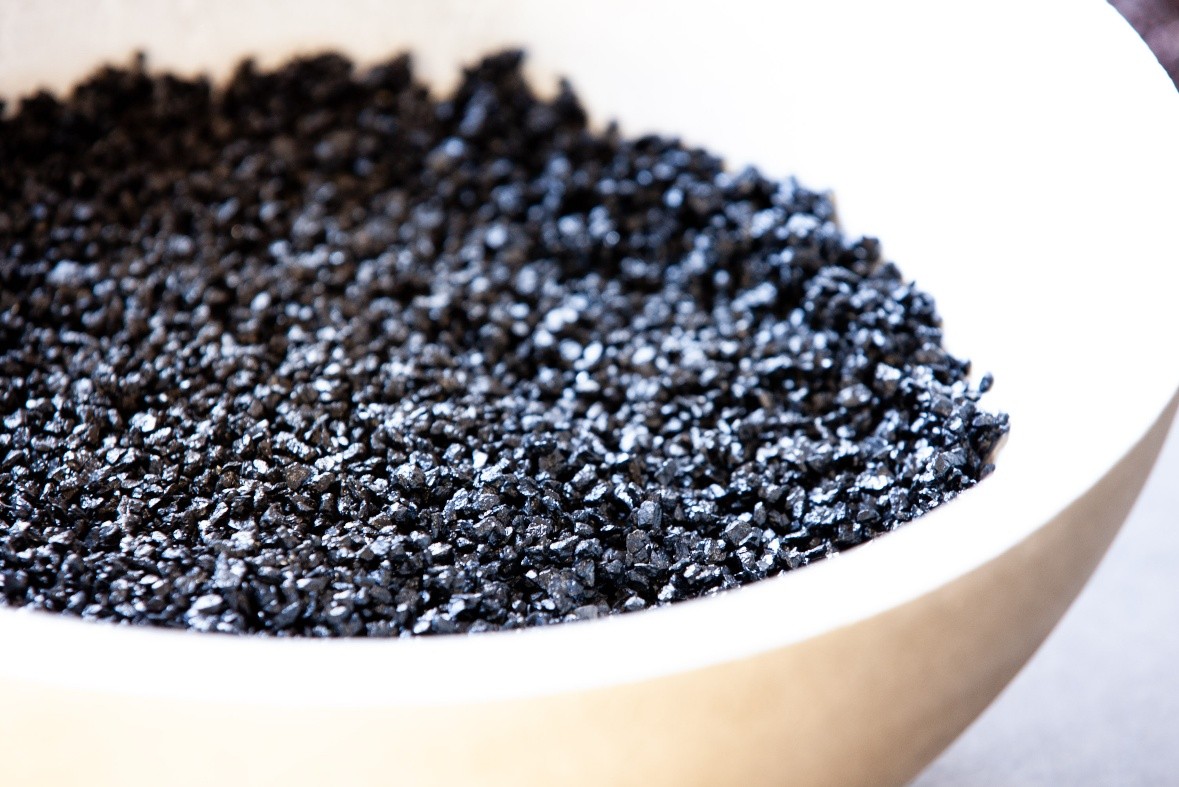James Cumming & Sons is your trusted supplier of Coconut Activated Carbon, a sustainable and high-performance filtration media derived from natural coconut shells.

Product description
With its micro-porous structure and exceptional hardness, coconut-based carbon delivers unmatched adsorption capacity for a wide range of applications, including water treatment, air purification, and industrial processes.
With over a century of expertise in carbon manufacturing and sourcing, James Cumming & Sons ensures reliable performance and sustainable solutions tailored to your needs. Choose renewable excellence with our Coconut Activated Carbon.
Specification(s) - Granular or Powdered
Particle Size
Customizable to client specifications
Bulk Density
450–550 kg/m³
Surface Area
1000–1300 m²/g
Pore Size Distribution
Predominantly microporous
Ash Content
<5%
Hardness
High mechanical durability
What is Coconut Activated Carbon?
Coconut Activated Carbon (CAC) is a premium activated carbon product derived from the shells of coconuts. Its micro-porous structure is optimised for the adsorption of small molecules, making it ideal for removing impurities from air, water, and other substances. Renowned for its renewable source, CAC is both eco-friendly and highly efficient.
Why Choose Coconut Activated Carbon?
- Renewable Resource: Made from natural and sustainable coconut shells.
- High Hardness: Exceptional durability reduces product loss during handling and use.
- Micro-Porous Structure: Optimized for removing small organic molecules and odours.
- High Purity: Low ash content and minimal impurities.
- Wide Applicability: Suitable for both industrial and domestic applications.
Applications
Coconut Activated Carbons are widely used in:
- Water Treatment: Removal of chlorine, and chloramines in drinking water and wastewater treatment.
- Air Purification: Effective in odour control and VOC removal.
- Industrial Applications: Suitable for gold recovery, solvent recovery, and chemical processing.
- Gold Recovery: Utilised extensively in gold recovery operations.
- Medical Uses: Used in the production of pharmaceutical-grade filtration systems.
- Food and Beverage: Purification of liquids like edible oils, sugar solutions, and beverages.
Packaging
- Our Coconut Activated Carbons are available in:
- Bulk Bags: 500kg bulk bags with bottom discharge spouts and lifting lugs.
- Smaller Bags: 25 kg woven polypropylene sacks, shrink-wrapped for easy handling and storage.
- Custom Packaging: Tailored solutions for export and project-specific requirements.
Projects
Dungog WTP
This was the first contact filtration plant in Australia to use large effective size media, after pilot plant work by the Hunter Water Corporation. It was also the first to use C & S Brand Australian Filter Coal and remains an industry frontrunner with long-term results, durability and consistency.
How Our Coconut Activated Carbons Excel
At James Cumming & Sons, we source only the highest-quality coconut shell based activated carbon that meets rigorous performance standards. Our Coconut Activated Carbons offer exceptional adsorption efficiency, durability, and environmental sustainability, making them a trusted choice for diverse industries.
FAQs
What is coconut shell activated Carbon typically used for?
Drinking water treatment – removes chlorine, taste, odours, and organic contaminants (including PFAS).
Wastewater and stormwater filtration – ideal for councils and water utilities seeking sustainable, high-performance filtration media.
Gold recovery and mining – used in CIP/CIL circuits due to its hardness and low attrition loss.
Air and gas purification – removes VOCs and industrial fumes in HVAC and process systems.
Food and beverage processing – purifies liquids without affecting taste or aroma.
What's the difference between coconut, coal and wood based Activated Carbons?
Coconut shell activated carbon High in micropores, ideal for removing small molecules like VOCs in water and air treatment. It’s seen as more renewable and commonly used in point of use drinking water systems.
Coal-based activated carbon: Contains a mix of micro- and mesopores, making it versatile for industrial filtration, potable filtration, and wastewater treatment. Often preferred for larger projects due to cost and availability from local sources in Australia. Best for generalist type applications.
Wood-based activated carbon: superior macropores, suited for colour removal, large molecule adsorption.
Can we export Coconut Activated Carbon from Australia?
James Cumming sources imported variants of Coconut Carbon for our Australian Customers in various industries. There are no local manufacturers in Australia of Coconut-shell based activated Carbons, hence why we have built a trusted supply network of coconut-shell based activated carbons for import and distribution around Australia. So yes, while we can export, and do export some of our other products, for our overseas customers, there may be cost considerations that inhibit the viability of receiving coconut-based activated carbons as we are simply a distributor of these products.
What industries or applications are most common for coconut activated carbon in Australia?
Drinking water treatment – removal of chlorine, taste and odour compounds.
Air purification – control of volatile organic compounds (VOCs) and industrial gases.
Gold mining – used in CIP/CIL processes for precious metal recovery.
Food and beverage – decolourisation and purification of liquids.
Pharmaceuticals – refining active compounds in production.
Aquaculture and aquariums – maintaining safe water conditions.
At James Cumming & Sons, we supply high-grade coconut activated carbon tailored to Australian water authorities, councils, and industrial clients.
What is the difference between coconut-shell based carbons and coal-based Carbons?
Coconut-based activated carbon have a high micropore volume, making it ideal for removing small contaminants like VOCs and chlorine in drinking water and air purification. It’s also seen to be more renewable and sustainably sourced.
Coal-based activated carbon contains both micro- and mesopores, offering broader adsorption capacity of molecular weight contaminants of concern. It’s widely used in potable water treatment, industrial wastewater treatment, removal of PFAS and bulk filtration systems due to its durability and cost-effectiveness. Coal-based carbons are better for generalist applications.





















